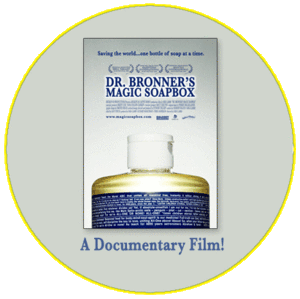On “Dr. Bronner’s Magic Soapbox” and Foster Care

I finally saw Dr. Bronner’s Magic Soapbox yesterday and it made me rethink my personal soft boycott of the products. The religious messages on the labels always bothered me, plus I found the soap to leave a tacky sort of film on my skin and hair. I never brushed my teeth with it, as I’m very particular about tooth care products. But my relationship with Dr. Bronner’s ended years ago, and I just might give it another whirl.
Here’s what I discovered, which is something confirmed each time a new youth comes to Turtle Nest Village out of foster care: Most people abused and neglected by their parents can’t wait to get another opportunity to try to have a relationship with their parents. In the case of foster kids, they might have been shuttled to a dozen homes or more before they turned 18, and on their 18th birthday, their first question is: Can you help me find my (birth) mother?
Dr. Bronner left his three children with various people and in orphanages over the years and went off to evangelize and sell soap. Once in a while he came back, arms wide open, and his children were thrilled to see him. But he would inevitably leave. For him, saving humanity and spreading his message about love and God ("The Moral ABCs") was more important than his own children (he does say that, by the way. That’s not a judgment by me.).
And guess what happens to the son who was most neglected by his father all his life (Ralph)? He spends seemingly every waking moment in the service of his father, spreading the message about his father’s remarkable life (that included, as you may know, getting institutionalized and given shock therapy, and then escaping). He has embraced his father’s message in his own way, and travels around hugging people, giving away soap, and connecting with one person at a time, touching each one’s heart.
The Bronner family history is fascinating and I didn’t know much about it (including decades of soap making, intervention and taking over by Nazis, death in concentration camps, and lots of mental and physical illness). And the Bronner’s of my generation, who run the daily business, don’t seem at all as colorful as their parents and grandparents. But apparently they’re good business people, and that’s what matters for their positions.
What makes me ponder trying Dr. Bronner’s products again is that in a world full of corporate corruption and malfeasance, the executives at Bronner’s make only five times what the lowest-paid workers make. And everyone gets treated with respect, no matter what their position is (that comes directly from the workers). And they give away 70% of their profits (although one of the projects they give to has to do with turning 1,000 chemically treated acres of farmland back into a natural buffalo range, which isn’t exactly a vegan investment, but I don’t think veganism is a value of theirs, as some of their products are not vegan).
If nothing else, this documentary gives us a window into the life of an eccentric man and shows how the choices he made profoundly affected–and in fact shaped–the life of one of his son’s, whom I’m sure would give anything to spend an afternoon with him, despite the way he was treated as a child. In that respect, this is a story that is played out every day, everywhere. It is both ordinary and extraordinary.



